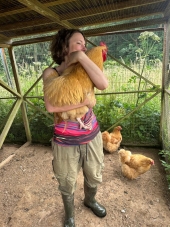Adam Lehn wrote:I have a dilemma that I would like to pose to the permies community, to see what y'all think.
I am almost at the point where I am ready to buy some land. I am currently in Southern Colorado, and love it here. I have been thinking of buying land in this general area for a while. There are lush green fields, rivers running through towns, beautiful mountains, and plenty of sunshine and fresh air.
However, I recently heard about a very dreary climate change forecast. Somebody told me about a report that they read that predicted that in 50 years, Grand Junction, CO will resemble the current climate of Tucson, AZ. That was not the first dreary prediction that I have heard. I also heard spoken that within 10 years Santa Fe, NM will resemble the current climate of Albuquerque. Regardless of the credibility of these reports, climate change seems like something very real, and must be reckoned with and anticipated.
My concern is that if I find a beautiful and lush piece of Earth to put my name on (in the eyes of other humans, at least), will it turn barren within my lifetime? Will I wake up one day and realize that there is no more water? I love it here now, but would it be a better idea to seek land a bit farther North?
Adam,
I share your concerns! I first heard about climate change back in 1983. (Unfortunately it was misnamed "global warming" early on -- a name that stuck and which, I believe, is partially responsible for the slow response to this ultimate global challenge. Climate change can go many ways -- mostly EXTREME -- and include greater cold and more serious storms in addition to overall warming trends.)
However, with warming in mind, I have spent the last 3 decades searching for what I hoped would be the best place to live once things start drying up. I started in the most obvious place -- looking for the places with the most water. Turns out Canada has more surface and ground water than any place else on Earth. So... my husband and I explored the possibilities of moving there. At that time, our currency was worth almost double that of Canada's so land was cheap. Unfortunately not free and we could never quite afford to buy. (Plus we had lots of animals and other concerns with moving to another country at that time.) Now I am glad we didn't make the move.
The more I know about climate change, the more I realize there is no perfect place to be and that "sheltering in place" is probably the most sane solution. No matter where you go, each region will have its own set of problems. In Canada for example, all that water is going to become a highly coveted resource when the rest of the world gets drier. That means more people, more competition and ultimately even bloodshed when, or IF things deteriorate to fighting over water rights. If you live somewhere that never had outstanding water resources to start with, you may find yourself in sole possession of those that remain when the rest of the world panics and moves to greener (and wetter) pastures. Of course, you still won't have a lot of water, but maybe more than you would get in a place where everyone is fighting over it.
In my opinion, the thing is to be prepared -- wherever you are.
Build covered cisterns and water tanks to hold rain water (or fill with well water if you have a drilled well or from a nearby creek, river or pond, if you have those) and KEEP THEM FILLED. Build ponds everywhere you can (assuming that you have proper drainage to fill them regularly when water is available -- otherwise they can be rather wasteful due to evaporation).
Save water by planting drought-tolerant plants and using water saving horticultural methods like hugelculture. Take baths only when absolutely necessary and stick to quick wash ups or very short showers otherwise. DO NOT own a swimming pool or hot tub! Use a composting toilet. Buy fewer clothes and wear them until they are actually dirty before laundering. Water is LIFE and as such it is for drinking. Everything else we use it for is secondary.
And above all, remember that though things may not come to such dire ends in your lifetime, they probably will in your kids or grandkids lives. Make your footprints on Earth as light and green as possible -- for them. If we had all done that many years ago, we wouldn't be in this mess now.


 1
1










 1
1












